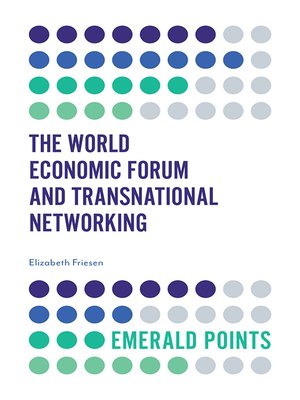
Sign up to save your library
With an OverDrive account, you can save your favorite libraries for at-a-glance information about availability. Find out more about OverDrive accounts.
Find this title in Libby, the library reading app by OverDrive.



Search for a digital library with this title
Title found at these libraries:
| Library Name | Distance |
|---|---|
| Loading... |
In recent years new political actors, drawing on innovative sources of power and legitimacy, have become increasingly influential in world politics. Traditional international politics is being supplemented by non-state actors, organizations, and networks.
The World Economic Forum and Transnational Networking presents an informative investigation of the WEF as a political actor and important part of transnational civil society. Drawing upon extensive original research, Friesen analyzes the surprising role the WEF has played in international processes such as the campaign for the cancellation of third world debt, a campaign which culminated in the adoption of the Multilateral Debt Relief Initiative at the G8 in 2005. Her findings provoke even wider questions about the role and influence of other non-state organizations and about transnational politics, questions that are particularly pressing at a time when the norms and formal institutional structures of the liberal international order appear to be eroding.
Theoretically rigorous, empirically sound, and engagingly written, this book is essential reading not only for researchers and students within international political economy, but also for practitioners within transnational organizations and transnational civil society campaigns.
The World Economic Forum and Transnational Networking presents an informative investigation of the WEF as a political actor and important part of transnational civil society. Drawing upon extensive original research, Friesen analyzes the surprising role the WEF has played in international processes such as the campaign for the cancellation of third world debt, a campaign which culminated in the adoption of the Multilateral Debt Relief Initiative at the G8 in 2005. Her findings provoke even wider questions about the role and influence of other non-state organizations and about transnational politics, questions that are particularly pressing at a time when the norms and formal institutional structures of the liberal international order appear to be eroding.
Theoretically rigorous, empirically sound, and engagingly written, this book is essential reading not only for researchers and students within international political economy, but also for practitioners within transnational organizations and transnational civil society campaigns.







